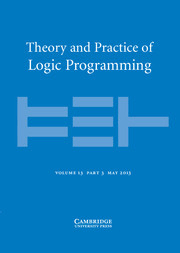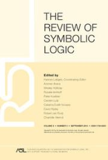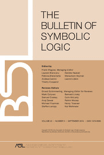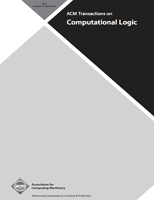
Australasian Journal of Logic
Scope & Guideline
Exploring the depths of logic and reasoning.
Introduction
Aims and Scopes
- Foundational and Philosophical Logic:
The journal frequently publishes papers that explore the foundational aspects of logic, including discussions on classical and non-classical logics, as well as philosophical implications of logical theories. - Mathematical Logic and Set Theory:
A significant focus is placed on mathematical logic, where researchers investigate set theory, model theory, and the interplay between logic and mathematics. - Paraconsistent and Relevant Logics:
The journal has a consistent emphasis on paraconsistent and relevant logics, examining frameworks that allow for the coexistence of contradictory information and the relevance of logical implications. - Proof Theory and Semantics:
Research in proof theory and semantics is a core area, with studies focusing on proof-theoretic approaches, type theory, and the semantic foundations of various logical systems. - Applications and Interdisciplinary Connections:
The journal also encourages papers that apply logical theories to other fields, highlighting interdisciplinary connections and the relevance of logic in diverse domains.
Trending and Emerging
- Feminist Perspectives in Logic:
Recent publications indicate a growing interest in feminist critiques and contributions to logic, exemplified by papers that explore the intersections of gender and logical theory, which signal a broader trend toward inclusivity in philosophical discourse. - Deep Disagreement and Non-Classical Logics:
There is an emerging focus on modeling deep disagreement, particularly in the context of default logic and non-classical logics, highlighting the relevance of logical frameworks in understanding complex discursive practices. - Compatibility and Inconsistency in Logic:
The exploration of compatibility among propositions and the implications of inconsistency in mathematical frameworks is becoming increasingly prominent, reflecting a trend toward grappling with paradoxes and the limitations of traditional logical systems. - Proof-Theoretic Semantics:
The journal is seeing a rise in interest in proof-theoretic semantics, with researchers investigating the connections between proofs and meaning, indicating a potential redirection towards foundational questions in logic.
Declining or Waning
- Classical Logic:
There appears to be a decreasing emphasis on classical logic as a standalone topic, with fewer papers dedicated solely to traditional logical frameworks, as researchers increasingly explore alternative and non-classical systems. - Standard Set Theory:
Research specifically focused on standard set theory has become less frequent, possibly due to a shift towards more complex and nuanced approaches to set-theoretic foundations. - Historical Studies in Logic:
Papers dedicated to the historical evolution of logical systems and figures are appearing less often, suggesting a potential shift towards more contemporary and applied logical research.
Similar Journals

THEORY AND PRACTICE OF LOGIC PROGRAMMING
Pioneering Insights in Artificial Intelligence and Software Development.THEORY AND PRACTICE OF LOGIC PROGRAMMING, published by Cambridge University Press, is a premier academic journal that delves into the evolving field of logic programming, offering insights and advancements from 2001 to 2024. With an ISSN of 1471-0684 and an E-ISSN of 1475-3081, this journal serves as a vital resource for researchers, professionals, and students interested in areas such as artificial intelligence, computational theory, and software development. In 2023, the journal was recognized for its excellence, achieving Q1 status in Computational Theory and Mathematics and Q2 in several other categories, underscoring its significant impact within the academic community. Despite not being open access, its robust content, curated by esteemed scholars, guarantees high-quality research and innovative methodologies that are crucial for advancing the field. The journal's rigorous peer-review process and its standings in Scopus rankings further emphasize its relevance and authority, making it a quintessential platform for disseminating key findings and fostering scholarly dialogue.

JOURNAL OF AUTOMATED REASONING
Unlocking Insights into Automated ReasoningJOURNAL OF AUTOMATED REASONING is a premier academic journal published by SPRINGER, focusing on the dynamic and evolving fields of Artificial Intelligence, Computational Theory and Mathematics, and Software. With an ISSN of 0168-7433 and E-ISSN 1573-0670, this journal ranks impressively in the second quartile (Q2) across multiple categories, reflecting its significant contribution to the advancement of knowledge in automated reasoning methodologies. Since its inception in 1985, it has served as a vital platform for researchers and professionals to share groundbreaking findings and innovative techniques, facilitating the exploration of algorithms, logical frameworks, and reasoning processes that underpin artificial intelligence systems. Although it does not currently offer Open Access options, it remains a highly regarded resource, cited widely in academia, with its impactful publications reflecting deep insights and rigorous scholarly standards. The journal’s esteemed status and its ongoing commitment to fostering a greater understanding of automated reasoning make it an invaluable asset for those dedicated to pushing the boundaries of these interdisciplinary fields.

Reports on Mathematical Logic
Unraveling the Complexities of Mathematical ReasoningReports on Mathematical Logic is an esteemed academic journal published by Jagiellonian University’s Theoretical Computer Science Department in Poland. Focusing on the interdisciplinary realms of logic and philosophy, this journal publishes rigorous research articles that explore the foundational aspects and implications of mathematical logic in various contexts. Although it currently maintains an open access model, the journal's impact can be seen through its categorized rankings, with a Q4 in Logic and a commendable Q2 in Philosophy as of 2023. This positions it as a valuable resource for academics seeking to engage with innovative ideas and methodologies in the field. Additionally, the journal has a historical academic presence, having converged in its publication years from 2011 to 2014 and again from 2016 to 2023, underscoring its ongoing commitment to advancing knowledge in logic. With a focus on contemporary research, Reports on Mathematical Logic is essential for researchers, professionals, and students aiming to stay at the forefront of logic studies.

Review of Symbolic Logic
Elevating Discourse in Symbolic AnalysisReview of Symbolic Logic is a prestigious academic journal published by Cambridge University Press, dedicated to advancing the field of logic through critical analysis and innovative research. Established in 2008, the journal has become a key fixture in the academic community, particularly recognized for its contributions in the realms of logic, mathematics (miscellaneous), and philosophy. With an impressive classification of Q1 across multiple categories in 2023, it ranks within the top echelons of its field, standing at 15th out of 41 in Logic and 29th out of 90 in miscellaneous mathematics, positioning itself as essential reading for scholars and practitioners alike. Although not Open Access, the journal offers robust access options through institutional subscriptions, providing an expansive platform for the dissemination of high-quality research. Review of Symbolic Logic aims to foster a deeper understanding of symbolic logic's applications and implications while inspiring emerging scholars and seasoned researchers to further the dialogue within this vibrant area of study.

Studia Logica
Illuminating the Path of Logical InquiryStudia Logica is a leading international journal published by Springer that focuses on the intricate interconnections between logic, philosophy, and the history of science. Established in 1953, this journal has garnered an esteemed reputation, consistently appearing in the Q1 category for History and Philosophy of Science and Q2 for Logic in 2023. With a robust Scopus ranking, where it stands at #42 out of 223 in the field of Arts and Humanities and #17 out of 41 in Mathematics (Logic), Studia Logica is pivotal for researchers and scholars keen on exploring the foundations and implications of logical theory and its applications. The journal does not follow an open access model, ensuring that the published work maintains a high standard of quality and rigor. Located in Dordrecht, Netherlands, the journal continues to be a crucial conduit for advancing scholarly discourse and disseminating cutting-edge research in its respective fields.

BULLETIN OF SYMBOLIC LOGIC
Connecting Scholars Through Symbolic InsightsBULLETIN OF SYMBOLIC LOGIC, published by Cambridge University Press, is a distinguished academic journal that serves as an essential platform for the dissemination of research in the realms of logic and philosophy. Since its inception in 1995, this journal has progressed through its convergence years and remains committed to fostering intellectual discourse among scholars. With a 2023 ranking in the Q1 category of Philosophy and a Q3 classification in Logic, it continues to uphold its reputation as a significant contributor to the field. While operating under a traditional subscription model, the journal dedicates itself to publishing high-quality articles that explore foundational issues, advanced theories, and innovative insights in symbolic logic. Researchers, professionals, and students will find invaluable resources within its pages, particularly as it ranks favorably among peers, with noteworthy standings in Scopus rankings. For those seeking to deepen their understanding of logical frameworks and their philosophical implications, BULLETIN OF SYMBOLIC LOGIC is an indispensable resource.

ERKENNTNIS
Championing innovative ideas in the realm of philosophy.ERKENNTNIS, published by SPRINGER, is a premier academic journal that has been advancing the study of philosophy and logic since its inception in 1919. With its esteemed ranking in the Q1 quartile for both categories as of 2023, it stands at the forefront of scholarly discourse, earning an impressive rank of #104 in the field of philosophy and #13 in logic according to the Scopus rankings. This influential publication not only contributes to the theoretical underpinnings of these disciplines but also fosters a vibrant exchange of ideas among researchers, professionals, and students alike. While it does not offer open access to its articles, the journal's esteemed reputation and rigorous peer-review process ensure that all published works maintain the highest standards of quality and intellectual inquiry, making ERKENNTNIS an essential resource for anyone engaged in these critical areas of study.

FUNDAMENTA MATHEMATICAE
Pioneering innovative insights in mathematics.FUNDAMENTA MATHEMATICAE is a distinguished journal in the realm of mathematics, focusing on algebra and number theory, published by the Polish Academy of Sciences, Institute of Mathematics - IMPAN. With a rich publication history dating back to the late 20th century, it serves as a vital platform for innovative research, fostering intellectual discourse among mathematicians globally. As a Q3 journal in the 2023 category for Algebra and Number Theory, it holds an essential place within the academic community, particularly noted for its contribution to advancing theoretical knowledge and practical applications in mathematics. Although it does not currently offer an open access model, the journal's commitment to quality and rigor ensures that the research disseminated is of high impact and relevance. It actively supports the scholarly pursuits of researchers, professionals, and students alike, making it an invaluable resource for those dedicated to the mathematical sciences.

Journal of Logic Language and Information
Innovating Thought: The Intersection of Logic and InformationThe Journal of Logic Language and Information, published by SPRINGER, stands as a leading interdisciplinary platform dedicated to the exploration of the interconnections between logic, language, and information theory. With a history spanning from 1992 to 2024, this esteemed journal provides a vital forum for researchers, professionals, and students in fields such as Computer Science, Linguistics, and Philosophy. Notably recognized in the 2023 rankings, it holds a Q2 quartile in Computer Science (miscellaneous) and Q1 quartiles in both Linguistics and Language, and Philosophy, reflecting its high academic quality and relevance. Despite its nuanced focus, the journal's diverse scope attracts a global readership, encouraging innovative research and critical discourse. Although it is not an Open Access publication, the Journal's valuable contributions can be accessed through various institutional subscriptions, ensuring that its scholarly output remains influential within the academic community.

ACM Transactions on Computational Logic
Elevating Standards in Logic and Computer ScienceACM Transactions on Computational Logic, published by the Association for Computing Machinery, is a premier journal dedicated to the advancement of computational logic, spanning the disciplines of computer science and mathematics. With its ISSN 1529-3785 and E-ISSN 1557-945X, this journal has established itself as a vital resource within the academic community, particularly noted for its influential contributions reflected in its 2023 scopus rankings. The journal holds notable quartile rankings, achieving Q1 in the fields of Computer Science (miscellaneous) and Logic, alongside Q2 in Computational Mathematics and Theoretical Computer Science, indicating its prestigious position in the respective categories. Researchers, practitioners, and students can access a wealth of rigorous research articles that delve into both theoretical frameworks and practical applications of computational logic, fostering innovation and collaboration in the field. As it converges towards its 2024 objectives, ACM Transactions on Computational Logic continues to uphold a commitment to excellence and impact, striving to shape the future of computational theories and methodologies.